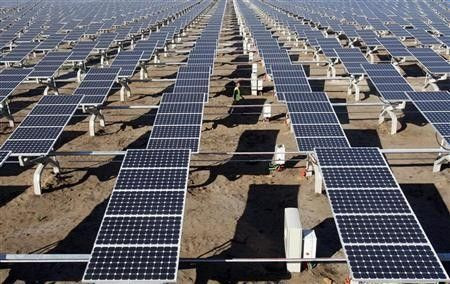Advanced Energy Is Growing Two Times Faster Than The Global Economy

Global advanced energy, excluding wind power, grew twice as fast as the global economy last year, while wind energy boomed and busted over two years, according to a report commissioned by Advanced Energy Economy (AEE).
At $1.1 trillion in estimated global revenue last year, the advanced energy market includes everything from nuclear power to new lighting to ethanol. Advanced energy in the U.S. accounted for a $169 billion market in 2013, 15 percent of the global market and up from 11 percent in 2011, the study conducted by Navigant Research found.
Wind energy, however, took a $23 billion dive last year after a strong year in 2012. Uncertainty surrounding the federal production tax credit was a factor.
Excluding wind, the advanced energy market has grown with double-digits in the last two years, four times the growth of the global economy. From 2012 to 2013, the industry grew 14 percent, with the largest gains in solar, transportation and building energy.
"Advanced energy is a vibrant industry and a vital part of America's economic future. That's what this report shows," Graham Richard, CEO of AEE, said in a statement.
Solar photovoltaic revenue in the U.S. alone grew 97 percent from 2011, from $8.2 billion to $16.2 billion.
Revenue from advanced vehicles worldwide more than doubled over the two-year period. Sales of hybrid vehicles rose from $7.2 billion in 2011 to $14 billion in 2013, and sales of plug-in electric vehicles grew from $707 million in 2011 to $3.6 billion in 2013. Sales of natural gas trucks and buses also increased, from $102 million to $530 million.
Revenue from electricity generation in hydro, solar and biomass all increased over the two-year period, as well as revenue from advanced fuel production and advanced lighting.
The U.S. accounted for 34 percent of the global revenue from advanced fuels, primarily in biofuels and synthetic diesel and gasoline.
"As a nation, we need to seize on the opportunity that advanced energy provides to become more prosperous and energy independent," Richard said. "That means continued business investment, R&D to spur innovations, and smart government policies at the federal and state level to drive continued growth and job creation."
© Copyright IBTimes 2024. All rights reserved.












